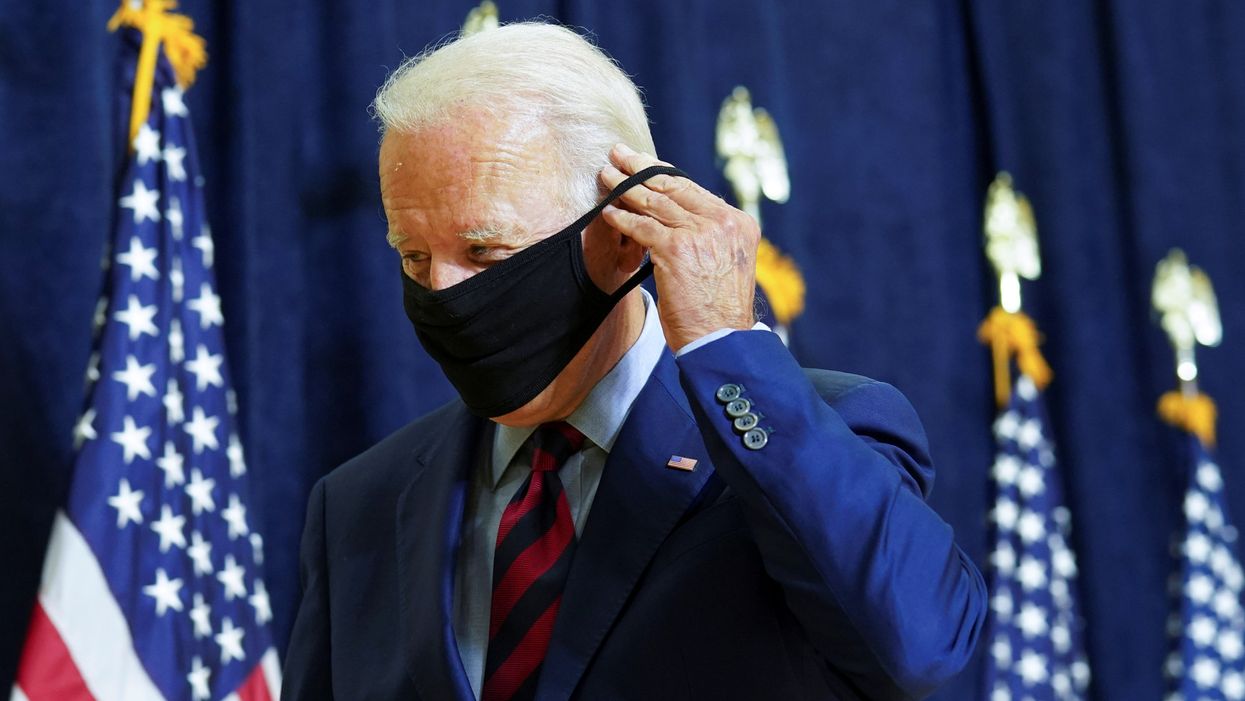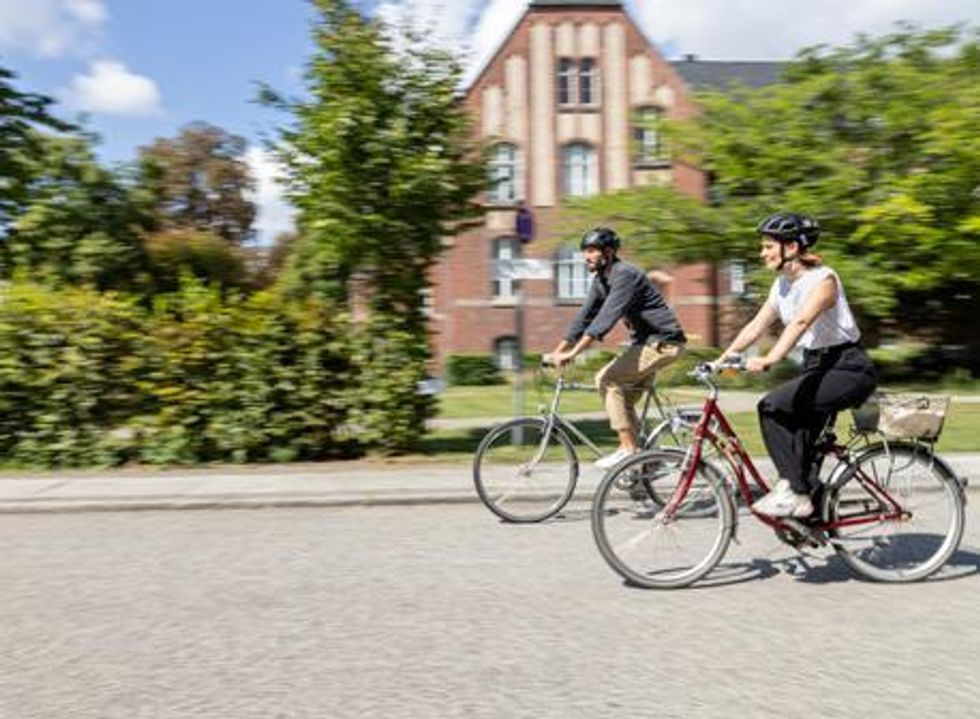Biden’s Administration Should Immediately Prioritize These Five Pandemic Tasks
Dr. Adalja is focused on emerging infectious disease, pandemic preparedness, and biosecurity. He has served on US government panels tasked with developing guidelines for the treatment of plague, botulism, and anthrax in mass casualty settings and the system of care for infectious disease emergencies, and as an external advisor to the New York City Health and Hospital Emergency Management Highly Infectious Disease training program, as well as on a FEMA working group on nuclear disaster recovery. Dr. Adalja is an Associate Editor of the journal Health Security. He was a coeditor of the volume Global Catastrophic Biological Risks, a contributing author for the Handbook of Bioterrorism and Disaster Medicine, the Emergency Medicine CorePendium, Clinical Microbiology Made Ridiculously Simple, UpToDate's section on biological terrorism, and a NATO volume on bioterrorism. He has also published in such journals as the New England Journal of Medicine, the Journal of Infectious Diseases, Clinical Infectious Diseases, Emerging Infectious Diseases, and the Annals of Emergency Medicine. He is a board-certified physician in internal medicine, emergency medicine, infectious diseases, and critical care medicine. Follow him on Twitter: @AmeshAA

Democratic U.S. presidential nominee and former Vice President Joe Biden puts his face mask back on after answering questions following a speech on the effects on the U.S. economy of the Trump administration's response to the coronavirus disease (COVID-19) pandemic during a campaign event in Wilmington, Delaware, U.S., September 4, 2020.
The response to the COVID-19 pandemic will soon become the responsibility of President-elect Biden. As is clear to anyone who honestly looks, the past 10+ months of this pandemic have been a disastrous litany of mistakes, wrong actions, and misinformation.
The result has been the deaths of 240,000 Americans, economic collapse, disruption of routine healthcare, and inability of Americans to pursue their values without fear of contracting or spreading a deadly infectious disease. With the looming change in administration, many proposals will be suggested for the path forward.
Indeed, the Biden campaign published their own plan. This plan encompasses many of the actions my colleagues and I in the public health and infectious disease fields have been arguing for since January. Several of these points, I think, bear emphasis and should be aggressively pursued to help the U.S. emerge from the pandemic.
Support More and Faster Tests
When it comes to an infectious disease outbreak the most basic question that must be answered in any response is: "Who is infected and who is not?" Even today this simple question is not easy to answer because testing issues continue to plague us and there are voices who oppose more testing -- as if by not testing, the cases of COVID cease to exist. While testing is worlds better than it was in March – especially for hospital inpatients – it is still a process fraught with unnecessary bureaucracy and delays in the outpatient setting.
Just this past week, friends and colleagues have had to wait days upon days to get a result back, all the while having to self-quarantine pending the result. This not only leaves people in limbo, it discourages people from being tested, and renders contact tracing almost moot. A test that results in several days is almost useless to contact tracers as Bill Gates has forcefully argued.
We need more testing and more actionable rapid turn-around tests. These tests need to be deployed in healthcare facilities and beyond. Ideally, these tests should be made available for individuals to conduct on themselves at home. For some settings, such as at home, rapid antigen tests similar to those used to detect pregnancy will be suitable; for other settings, like at a doctor's office or a hospital, more elaborate PCR tests will still be key. These last have been compromised for several months due to rationing of the reagent supplies necessary to perform the test – an unacceptable state of affairs that cannot continue. Reflecting an understanding of the state of play of testing, the President-elect recently stated: "We need to increase both lab-based diagnostic testing, with results back within 24 hours or less, and faster, cheaper screening tests that you can take right at home or in school."
Roll Out Safe and Effective Vaccine(s)
Biden's plan also identifies the need to "accelerate the development of treatments and vaccines" and indeed Operation Warp Speed has been one solitary bright spot in the darkness of the failed pandemic response. It is this program that facilitated a distribution partnership with Pfizer for 100 million doses of its mRNA vaccine -- whose preliminary, and extremely positive data, was just announced today to great excitement.
Operation Warp Speed needs to be continued so that we can ensure the final development and distribution of the first-generation vaccines and treatments. When a vaccine is available, it will be a Herculean task that will span many months to actually get into the arms (twice as a 2-dose vaccine) of Americans. Vaccination may begin for healthcare workers before a change in administration, but it will continue long into 2021 and possibly longer. Vaccine distribution will be a task that demands a high degree of competence and coordination, especially with the extreme cold storage conditions needed for the vaccines.
Anticipate the Next Pandemic Now
Not only should Operation Warp Speed be supported, it needs to be expanded. For too long pandemic preparedness has been reactive and it is long past time to approach the development of medical countermeasures for pandemic threats in a proactive fashion.
What we do for other national security threats should be the paradigm for infectious disease threats that too often are subject to a mind-boggling cycle of panic and neglect. There are an estimated 200 outbreaks of viral diseases per year. Luckily and because of hard work, for many of them we have tools at our hands to control them, but for the unknown 201st virus outbreak we do not –as we've seen this year. And, the next unknown virus will likely appear soon. A new program must be constructed guaranteeing that we will never again be caught blindsided and flatfooted as we have been with the COVID-19 pandemic.
A new dedicated "Virus 201" strategy, program, and funding must be created to achieve this goal. This initiative should be a specific program focused on unknown threats that emanate from identified classes of pathogens that possess certain pandemic-causing characteristics. For example, such a program could leverage new powerful vaccine platform technologies to begin development on vaccine candidates for a variety of viral families before they emerge as full-fledged threats. Imagine how different our world would be today if this action was taken after SARS in 2003 or even MERS in 2012.
Biden should remove the handcuffs from the Centers for Disease Control and Prevention (CDC) and allow its experts to coordinate the national response and to issue guidance in the manner they were constituted to do without fear of political reprisal.
Resurrect Expertise
One of the most disheartening aspects of the pandemic has been the denigration and outright attacks on experts in infectious disease. Such disgusting attacks were not for any flaws, incompetence, or weakness but for their opposite -- strength and competence – and emanated from a desire to evade the grim reality. Such nihilism must end and indeed the Biden plan contains several crucial remedies, including the restoration of the White House National Security Council Directorate for Global Health Security and Biodefense, a crucial body of experts at the White House that the Trump administration bafflingly eliminated in 2018.
Additionally, Biden should remove the handcuffs from the Centers for Disease Control and Prevention (CDC) and allow its experts to coordinate the national response and to issue guidance in the manner they were constituted to do without fear of political reprisal.
Shore Up Hospital Capacity
For the foreseeable future, as control of the virus slips away in certain parts of the country, hospital capacity will be the paramount concern. Unlike many other industries, the healthcare sector is severely constrained in its ability to expand capacity because of regulatory and financial considerations. Hospital emergency preparedness has never been prioritized and until we can substantially curtail the spread of this virus, hospitals must remain vigilant.
We have seen how suspensions of "elective" procedures led to alarming declines in vital healthcare services that range from childhood immunization to cancer chemotherapy to psychiatric care. This cannot be allowed to happen again. Hospitals will need support in terms of staffing, alternative care sites, and personal protective equipment. Reflecting these concerns, the Biden plan outlines an approach that smartly uses the Departments of Defense and Veterans Affairs assets and medical reserve corps, coupled to the now-flourishing telemedicine innovations, to augment capacity and forestall the need for hospitals to shift to crisis standards of care.
To these five tasks, I would add a long list of subtasks that need to be executed by agencies such as the Centers for Medicare and Medicaid, the Food and Drug Administration, and many other arms of government. But, to me, these are the most crucial.
***
As COVID-19 has demonstrated, new deadly viruses can spread quickly and easily around the globe, causing significant loss of life and economic ruin. With nearly 200 epidemics occurring each year, the next fast-moving, novel infectious disease pandemic could be right around the corner.
The upcoming transition affords the opportunity to implement a new paradigm in pandemic response, biosecurity, and emerging disease response. The United States and President-elect Biden must work hard to to end this pandemic and increase the resilience of the United States to the future infectious disease threats we will surely face.
Dr. Adalja is focused on emerging infectious disease, pandemic preparedness, and biosecurity. He has served on US government panels tasked with developing guidelines for the treatment of plague, botulism, and anthrax in mass casualty settings and the system of care for infectious disease emergencies, and as an external advisor to the New York City Health and Hospital Emergency Management Highly Infectious Disease training program, as well as on a FEMA working group on nuclear disaster recovery. Dr. Adalja is an Associate Editor of the journal Health Security. He was a coeditor of the volume Global Catastrophic Biological Risks, a contributing author for the Handbook of Bioterrorism and Disaster Medicine, the Emergency Medicine CorePendium, Clinical Microbiology Made Ridiculously Simple, UpToDate's section on biological terrorism, and a NATO volume on bioterrorism. He has also published in such journals as the New England Journal of Medicine, the Journal of Infectious Diseases, Clinical Infectious Diseases, Emerging Infectious Diseases, and the Annals of Emergency Medicine. He is a board-certified physician in internal medicine, emergency medicine, infectious diseases, and critical care medicine. Follow him on Twitter: @AmeshAA
Some hospitals are pioneers in ditching plastic, turning green
In the U.S., hospitals generate an estimated 6,000 tons of waste per day. A few clinics are leading the way in transitioning to clean energy sources.
This is part 2 of a three part series on a new generation of doctors leading the charge to make the health care industry more sustainable - for the benefit of their patients and the planet. Read part 1 here and part 3 here.
After graduating from her studies as an engineer, Nora Stroetzel ticked off the top item on her bucket list and traveled the world for a year. She loved remote places like the Indonesian rain forest she reached only by hiking for several days on foot, mountain villages in the Himalayas, and diving at reefs that were only accessible by local fishing boats.
“But no matter how far from civilization I ventured, one thing was already there: plastic,” Stroetzel says. “Plastic that would stay there for centuries, on 12,000 foot peaks and on beaches several hundred miles from the nearest city.” She saw “wild orangutans that could be lured by rustling plastic and hermit crabs that used plastic lids as dwellings instead of shells.”
While traveling she started volunteering for beach cleanups and helped build a recycling station in Indonesia. But the pivotal moment for her came after she returned to her hometown Kiel in Germany. “At the dentist, they gave me a plastic cup to rinse my mouth. I used it for maybe ten seconds before it was tossed out,” Stroetzel says. “That made me really angry.”
She decided to research alternatives for plastic in the medical sector and learned that cups could be reused and easily disinfected. All dentists routinely disinfect their tools anyway and, Stroetzel reasoned, it wouldn’t be too hard to extend that practice to cups.
It's a good example for how often plastic is used unnecessarily in medical practice, she says. The health care sector is the fifth biggest source of pollution and trash in industrialized countries. In the U.S., hospitals generate an estimated 6,000 tons of waste per day, including an average of 400 grams of plastic per patient per day, and this sector produces 8.5 percent of greenhouse gas emissions nationwide.
“Sustainable alternatives exist,” Stroetzel says, “but you have to painstakingly look for them; they are often not offered by the big manufacturers, and all of this takes way too much time [that] medical staff simply does not have during their hectic days.”
When Stroetzel spoke with medical staff in Germany, she found they were often frustrated by all of this waste, especially as they took care to avoid single-use plastic at home. Doctors in other countries share this frustration. In a recent poll, nine out of ten doctors in Germany said they’re aware of the urgency to find sustainable solutions in the health industry but don’t know how to achieve this goal.
After a year of researching more sustainable alternatives, Stroetzel founded a social enterprise startup called POP, short for Practice Without Plastic, together with IT expert Nicolai Niethe, to offer well-researched solutions. “Sustainable alternatives exist,” she says, “but you have to painstakingly look for them; they are often not offered by the big manufacturers, and all of this takes way too much time [that] medical staff simply does not have during their hectic days.”
In addition to reusable dentist cups, other good options for the heath care sector include washable N95 face masks and gloves made from nitrile, which waste less water and energy in their production. But Stroetzel admits that truly making a medical facility more sustainable is a complex task. “This includes negotiating with manufacturers who often package medical materials in double and triple layers of extra plastic.”
While initiatives such as Stroetzel’s provide much needed information, other experts reason that a wholesale rethinking of healthcare is needed. Voluntary action won’t be enough, and government should set the right example. Kari Nadeau, a Stanford physician who has spent 30 years researching the effects of environmental pollution on the immune system, and Kenneth Kizer, the former undersecretary for health in the U.S. Department of Veterans Affairs, wrote in JAMA last year that the medical industry and federal agencies that provide health care should be required to measure and make public their carbon footprints. “Government health systems do not disclose these data (and very rarely do private health care organizations), unlike more than 90% of the Standard & Poor’s top 500 companies and many nongovernment entities," they explained. "This could constitute a substantial step toward better equipping health professionals to confront climate change and other planetary health problems.”
Compared to the U.K., the U.S. healthcare industry lags behind in terms of measuring and managing its carbon footprint, and hospitals are the second highest energy user of any sector in the U.S.
Kizer and Nadeau look to the U.K. National Health Service (NHS), which created a Sustainable Development Unit in 2008 and began that year to conduct assessments of the NHS’s carbon footprint. The NHS also identified its biggest culprits: Of the 2019 footprint, with emissions totaling 25 megatons of carbon dioxide equivalent, 62 percent came from the supply chain, 24 percent from the direct delivery of care, 10 percent from staff commute and patient and visitor travel, and 4 percent from private health and care services commissioned by the NHS. From 1990 to 2019, the NHS has reduced its emission of carbon dioxide equivalents by 26 percent, mostly due to the switch to renewable energy for heat and power. Meanwhile, the NHS has encouraged health clinics in the U.K. to install wind generators or photovoltaics that convert light to electricity -- relatively quick ways to decarbonize buildings in the health sector.
Compared to the U.K., the U.S. healthcare industry lags behind in terms of measuring and managing its carbon footprint, and hospitals are the second highest energy user of any sector in the U.S. “We are already seeing patients with symptoms from climate change, such as worsened respiratory symptoms from increased wildfires and poor air quality in California,” write Thomas B. Newman, a pediatrist at the University of California, San Francisco, and UCSF clinical research coordinator Daisy Valdivieso. “Because of the enormous health threat posed by climate change, health professionals should mobilize support for climate mitigation and adaptation efforts.” They believe “the most direct place to start is to approach the low-lying fruit: reducing healthcare waste and overuse.”
In addition to resulting in waste, the plastic in hospitals ultimately harms patients, who may be even more vulnerable to the effects due to their health conditions. Microplastics have been detected in most humans, and on average, a human ingests five grams of microplastic per week. Newman and Valdivieso refer to the American Board of Internal Medicine's Choosing Wisely program as one of many initiatives that identify and publicize options for “safely doing less” as a strategy to reduce unnecessary healthcare practices, and in turn, reduce cost, resource use, and ultimately reduce medical harm.
A few U.S. clinics are pioneers in transitioning to clean energy sources. In Wisconsin, the nonprofit Gundersen Health network became the first hospital to cut its reliance on petroleum by switching to locally produced green energy in 2015, and it saved $1.2 million per year in the process. Kaiser Permanente eliminated its 800,000 ton carbon footprint through energy efficiency and purchasing carbon offsets, reaching a balance between carbon emissions and removing carbon from the atmosphere in 2020, the first U.S. health system to do so.
Cleveland Clinic has pledged to join Kaiser in becoming carbon neutral by 2027. Realizing that 80 percent of its 2008 carbon emissions came from electricity consumption, the Clinic started switching to renewable energy and installing solar panels, and it has invested in researching recyclable products and packaging. The Clinic’s sustainability report outlines several strategies for producing less waste, such as reusing cases for sterilizing instruments, cutting back on materials that can’t be recycled, and putting pressure on vendors to reduce product packaging.
The Charité Berlin, Europe’s biggest university hospital, has also announced its goal to become carbon neutral. Its sustainability managers have begun to identify the biggest carbon culprits in its operations. “We’ve already reduced CO2 emissions by 21 percent since 2016,” says Simon Batt-Nauerz, the director of infrastructure and sustainability.
The hospital still emits 100,000 tons of CO2 every year, as much as a city with 10,000 residents, but it’s making progress through ride share and bicycle programs for its staff of 20,000 employees, who can get their bikes repaired for free in one of the Charité-operated bike workshops. Another program targets doctors’ and nurses’ scrubs, which cause more than 200 tons of CO2 during manufacturing and cleaning. The staff is currently testing lighter, more sustainable scrubs made from recycled cellulose that is grown regionally and requires 80 percent less land use and 30 percent less water.

The Charité hospital in Berlin still emits 100,000 tons of CO2 every year, but it’s making progress through ride share and bicycle programs for its staff of 20,000 employees.
Wiebke Peitz | Specific to Charité
Anesthesiologist Susanne Koch spearheads sustainability efforts in anesthesiology at the Charité. She says that up to a third of hospital waste comes from surgery rooms. To reduce medical waste, she recommends what she calls the 5 Rs: Reduce, Reuse, Recycle, Rethink, Research. “In medicine, people don’t question the use of plastic because of safety concerns,” she says. “Nobody wants to be sued because something is reused. However, it is possible to reduce plastic and other materials safely.”
For instance, she says, typical surgery kits are single-use and contain more supplies than are actually needed, and the entire kit is routinely thrown out after the surgery. “Up to 20 percent of materials in a surgery room aren’t used but will be discarded,” Koch says. One solution could be smaller kits, she explains, and another would be to recycle the plastic. Another example is breathing tubes. “When they became scarce during the pandemic, studies showed that they can be used seven days instead of 24 hours without increased bacteria load when we change the filters regularly,” Koch says, and wonders, “What else can we reuse?”
In the Netherlands, TU Delft researchers Tim Horeman and Bart van Straten designed a method to melt down the blue polypropylene wrapping paper that keeps medical instruments sterile, so that the material can be turned it into new medical devices. Currently, more than a million kilos of the blue paper are used in Dutch hospitals every year. A growing number of Dutch hospitals are adopting this approach.
Another common practice that’s ripe for improvement is the use of a certain plastic, called PVC, in hospital equipment such as blood bags, tubes and masks. Because of its toxic components, PVC is almost never recycled in the U.S., but University of Michigan researchers Danielle Fagnani and Anne McNeil have discovered a chemical process that can break it down into material that could be incorporated back into production. This could be a step toward a circular economy “that accounts for resource inputs and emissions throughout a product’s life cycle, including extraction of raw materials, manufacturing, transport, use and reuse, and disposal,” as medical experts have proposed. “It’s a failure of humanity to have created these amazing materials which have improved our lives in many ways, but at the same time to be so shortsighted that we didn’t think about what to do with the waste,” McNeil said in a press release.
Susanne Koch puts it more succinctly: “What’s the point if we save patients while killing the planet?”
The Friday Five: A surprising health benefit for people who have kids
In this week's Friday Five, your kids may be stressing you out, but research suggests they're actually protecting a key aspect of your health. Plus, a new device unlocks the heart's secrets, super-ager gene transplants and more.
The Friday Five covers five stories in research that you may have missed this week. There are plenty of controversies and troubling ethical issues in science – and we get into many of them in our online magazine – but this news roundup focuses on scientific creativity and progress to give you a therapeutic dose of inspiration headed into the weekend.
Listen on Apple | Listen on Spotify | Listen on Stitcher | Listen on Amazon | Listen on Google
Here are the promising studies covered in this week's Friday Five:
- Kids stressing you out? They could be protecting your health.
- A new device unlocks the heart's secrets
- Super-ager gene transplants
- Surgeons could 3D print your organs before operations
- A skull cap looks into the brain like an fMRI

